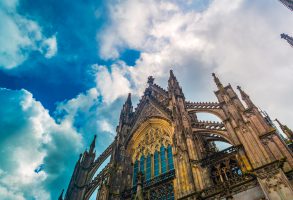Published December 19, 2011
One of your presentation topics was ‘The Leadership of John Paul II and the Lessons for Political History of the 21st Century’. What were your main points?
I stressed that the Pope had a dramatically different view of history and what makes history work and move. Pope John Paul II understood the importance of economics and politics, but he believed that culture was at the heart of history and that culture could change history in a more humane direction. If culture informs conscience, then consciences are aroused, and new forms of political and economic activity emerge from that. The great example of this is the rise of the solidarity movement in Poland in the wake of the Pope’s first pastoral visit to the country in June 1979. During that visit, the Pope ignited a revolution of conscience that made possible the solidarity movement that eventually led to the collapse of communism.
The second point is that the Pope, as he laid out in the encyclical Centesimus Annus (1991), had a clear view that democracy and the free economy are not machines that can run by themselves. It takes a certain kind of people possessed with certain virtues to make that machinery work and to allow free politics and free economies to lead to genuine human flourishing, as opposed to decadence and degradation.
The third point is that the Pope, at the end of his life, was deeply concerned that Europe’s attempt to build the 21st century European Union without any recognition of the historical role of Christianity in forming what we know today as the West, and without religiously informed moral arguments in public life, would lead to real trouble; that the effort to create what I call an ’empty shrine’ at the heart of Europe was going to have a severe effect on democratic political culture, and on individuals. And I think all of that is being borne out in the crisis of the European Union today.
You also presented on the topic ‘Western Civilisation and the Moral Challenges of the 21st century’. Can you elaborate?
In addition to the above points I want to emphasise that societies which measure the worth of human beings by utilitarian criteria rather than dignitarian criteria are headed for trouble. It turns out that the really prescient novel about dystopias of the future was not 1984; rather it was Brave New World. Brave New World leads us into a reflection on a manufactured and remanufactured humanity which is now within our technical grasp because of the revolution of genetics and biotechnology. It takes a society possessed of a deeper set of values, a deeper grasp of moral truths than you get to by simply asking the question, ‘does it work?’, in order to manage this explosion of knowledge and possibility, so that it does not end us up in the brave new world. If the only question we can ask and debate publicly is, ‘does it work?’, then we’re cooked.
In what way is religious freedom being threatened today?
The single most aggressive and biggest threat to religious freedom in the Western world today is the determination of homosexual activists to use coercive state power to redefine fundamental human relationships. This is a perfect example of what Pope Benedict XVI means by the dictatorship of relativism and the use of coercive state power to impose a relativist moral agenda upon all of society. And part of that agenda means driving religious conviction to the far margins of public life so that religious life becomes a mere lifestyle choice of no public consequence.
There are other problems. There is a kind of, quite frankly stupid, ‘laïcité’ as the French say, at work in the European Union; the notion that separation of religious and political authority somehow means the separation of the legislative from moral conviction in public life. This is complete rubbish and it is anti-democratic. If you tell people of religious conviction that they cannot bring the sources of their deepest commitments into their lives as citizens, you’ve done a very undemocratic thing. And we need to say that. We need to call to account the radical secularists for the undemocratic ideals that they uphold.
And then in First-World terms, there’s a huge problem with aggressive Islam. It’s not a question of whether Christians are persecuted in Muslim societies. The only question is how badly they are persecuted. And I don’t know any approach that makes sense except very assertive reassertion of the fundamental right of religious freedom. And that is going to require governments to confront the anti-Christian policies of Islamic states and also to confront otherwise well functioning democracies, such as India, which allow this persecution to take place.
Why was Pope John Paul II such an effective and strong leader?
All leadership begins with conviction, and then the question comes: is the conviction attached to something true or something false? Lenin was a very strong leader, but his leadership was attached to false objects. Pope John Paul II was in possession of, and had a real grasp of, certain key truths about the human person and the human condition and he was prepared to follow through on the implications of those truths in shaping his leadership of the Church and his work in the world.
Above all, what made Pope John Paul II the remarkable figure that he was, is that he was a radically converted Christian disciple. Everything he did, from the time of World War II on, whether in his priestly ministry, his literary work, his philosophical work, his work as a bishop, his work at the Second Vatican Council, his work as Archbishop of Krakow, as pope or as a statesman, it was an expression in several different ways of his radical conversion to Christ.
How did Pope John Paul II envisage the ‘New Evangelisation’?
Pope John Paul II believed that the Second Vatican Council was not an accident of the intuition of Blessed Pope John XXIII. Rather it was a providential gathering of the world Church on the edge of the third millennium, in order to prepare the Church for a new millennium of evangelical energy. With the benefit of hindsight now – it will be 50 years since the beginning of Vatican II next year – we can see the Council as the pivotal point between Counter-Reformation Catholicism (somewhat defensive, focused on institutional maintenance, defending what is ours against the Reformation and attacks from secular modernity) to Evangelical Catholicism.
Evangelical Catholicism is the Catholicism of the third millennium, in which the Church understands itself to be a missionary enterprise once again and in which everybody and everything in the Church is measured by mission effectiveness. This is a huge change. It is a more demanding form of Catholicism; it requires a fully engaged and educated laity. It means a more deeply prayerful Church, a more deeply sacramental Church and a more biblical Church, but it’s the Church of the future. And where Catholicism is growing in the developed world, it is because this evangelical Catholicism has taken hold. Where the Church is in trouble, it’s because people are still locked into the old paradigm of Counter-Reformation Catholicism and arguing uselessly over traditionalist interpretations of that, or so-called progressive interpretations of that. All of that is ancient history now, and we’re moving into a wholly new phase.
How has Pope Benedict XVI developed this work in his pontificate?
Both Pope John Paul II and Pope Benedict XVI are men of the Second Vatican Council. They played significant roles at the Council and are both formed by the mid 20th century Catholic Renaissance that led to the Second Vatican Council. Therefore it is be expected that their pontificates should be in dynamic continuity with each other; it is all one package. Changes in pontificates are not like going from Julia Gillard to Tony Abbott; it’s not a change of policy. The policy is the policy, and the Church is the Church and popes are servants of the tradition. They don’t create the tradition, they don’t make this up. Each pope of course gives a unique personal presentation of the basic truths of faith, but the pope is the servant of the Creed. He is not the master of the Creed; he is its custodian.
And this comes down through the hierarchy, to the bishops throughout the world. The notion that a bishop is some kind of discussion-group moderator, whose job is to keep everybody happy and in the conversation, is a false notion of the role of bishop. A bishop is supposed to be a teacher of the truths of the Catholic faith and the most effective bishops in the world today are those who do precisely that.
It can be very difficult being Catholic in what seems to be an increasingly secular culture. What words of encouragement do you have?
We need to recognise that the secular project is over; that the attempt to create humane, democratic, prosperous societies on the basis of that empty shrine I spoke about earlier has failed. We’re already seeing the first act of that failure playing out in Europe today. It’s time for us to get out of this defensive crouch and engage. We have nothing to be embarrassed about in putting the Gospel at the centre of not only our individual lives and our family lives, but of our lives as citizens as well. That’s the first trick that needs to be won here; to understand that we should be on the offence and not on the defence.
In those countries where Catholicism is declining, I think it has been a failure of the Church to preach the Gospel. For the young ones coming through, you don’t have to fight all the old battles we’ve been fighting for the past 50 years. It’s time to get on with the real revolution: the Evangelical Catholic revolution that brings people to Church, that produces vocations and good marriages.
Things can turn very quickly. For instance, the Church in English-speaking Canada is in a far better condition now than it was five years ago because of a series of very strong appointments to the major cities. All these men are men of Evangelical Catholicism, so bishops are crucial. But this is going to be a lay-led evangelisation, in business, in labour, in culture, in media, and in politics. We all have a role to play, so there is reason for hope.
George Weigel is Distinguished Senior Fellow of the Ethics and Public Policy Center in Washington, D.C. and holds EPPC’s William E. Simon Chair in Catholic Studies.









